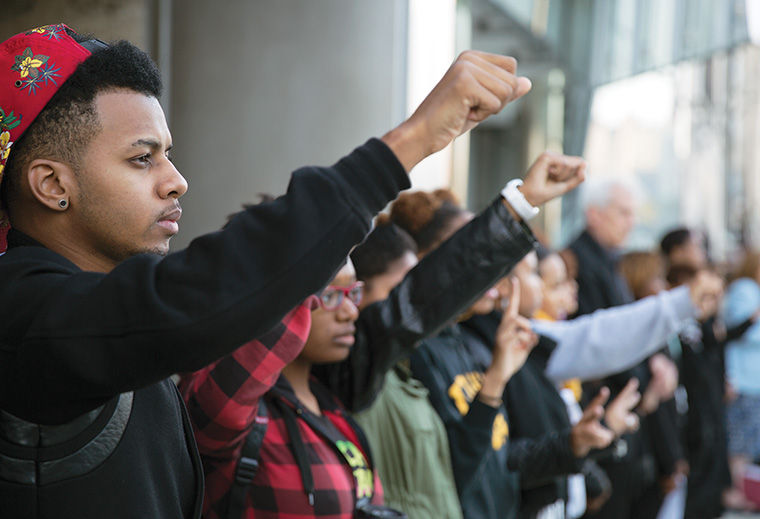Columbia protesters denounce police brutality
September 22, 2014

Bernard Mull Jr., a sophomore art + design major, took part in a Sept. 16 demonstration sponsored by the college’s Black Student Union to protest the Aug. 9 shooting of Michael Brown at the hands of the police in Ferguson, Missouri. The protest, which took place outside of the 618 S. Michigan Ave. Building, drew more than 100 people.
Dressed in all black, members of the Black Student Union stood in silence Sept. 17 for 10 minutes with their fists in the air and their hands up to protest the death of Michael Brown, an 18-year-old who was shot Aug. 9 by police in Ferguson, Missouri, and to raise awareness of increasingly excessive police brutality in the U.S.
A line of more than 100 students, staff, administrators and faculty stretched across the sidewalk in front of the 618 S. Michigan Ave. Building as part of the protest. The demonstration sparked a more detailed dialogue shortly afterward surrounding racism in America, unifying the school’s black community and spreading awareness about civil rights.
Administrators, including President Kwang-Wu Kim, Kim’s Chief of Staff Dayle Matchett and Vice President of Student Success Mark Kelly, stood alongside students as part of the protest.
The administration wanted to show support for its students, said Anne-Marie St. Germaine, interim vice president of Communications & Marketing. She said she hopes that the assembly will raise visibility, awareness and encourage people to think about issues surrounding people of color because those issues affect everyone.
“We all want to support our students on what’s now a very important issue in our country perhaps more than ever,” St. Germaine said. “It’s important to call attention to issues of justice and fairness.”
Kelly said he wanted to show his support for their efforts and that it is important for the administration to support students’ endeavors. He said he was proud of BSU for organizing this demonstration because it is a significant national issue. He also said that there was a sense of solidarity as more members of the Columbia community joined in the moment of silence.
“You heard in the students’ voices and in their discussion both their frustration and concern,” Kelly said. “Our students talked about how, unfortunately, police brutality is part of their life, and that solutions may be difficult, but it’s a sobering reminder of how race plays in America.”
Following the moment of silence, the Black Student Union leaders originally led protesters into the Multicultural Affairs office but later moved the discussion to the lobby of Stage Two to accommodate the larger than expected crowd where they further discussed issues surrounding police brutality such as racism, classism, violence in communities of color and black history.
To start the conversation, Robert Hanserd, lecturer in the Humanities, History and Social Sciences Department, informed the crowd of unemployment, incarceration and crime statistics to discuss how those figures related to the problem of police brutality.
Hanserd said during the forum that 88 percent of black male teens in Illinois were jobless in 2012 and 92 percent of all black male teens in Chicago ages 16–19 were unemployed, according to the Chicago Urban League.
The organization also distributed instructions on what to do when approached by law enforcement officials on the street, on the road or immigration agents at their home.
One tip advised students to stay calm and ask if they are free to leave. Another reminded students that, as citizens, they have the right to remain silent and that they do not have to consent to police searches.
Jasmine Brown, BSU secretary and a junior radio major, said she was pleased with the protest turnout, and she was happy to have the support of the administration and faculty. She said she hopes that government officials pay attention in the future to what is happening in neighborhoods and make policies that will help communities prosper.
“As the black community and the community as a whole, we need to educate, we need to talk and we need to move,” Brown said. “As citizens, we have rights, and oftentimes we forget that.”
It is important to share opinions with one another to make sense of the issues at hand, said Paris Newton, a sophomore cinema art + science major who spoke during the discussion.
Protests like this increase the visibility of these types of issues, making them more difficult to ignore, she said. In the future, people should remember their rights, remind others and speak out against police misconduct.
“There constantly needs to be a dialogue in the black community because I think communication is key,” Newton said. “If we’re not talking about our issues and our experiences, then we just suffer in silence.”







